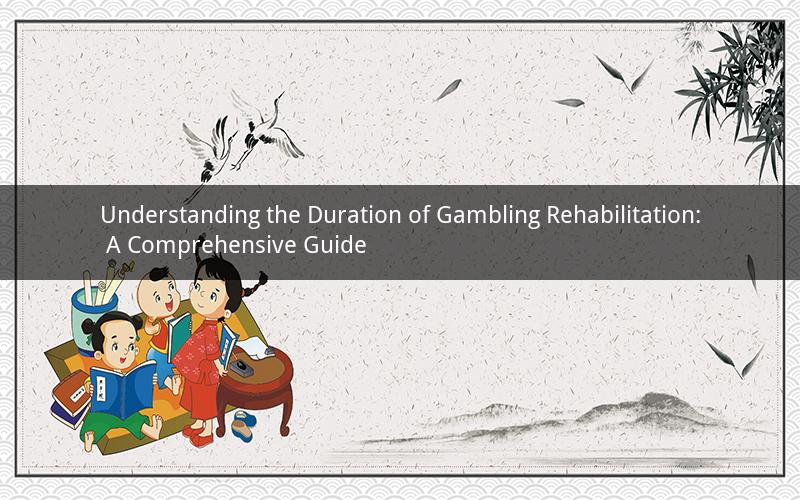
1. Introduction
Gambling addiction is a serious issue that affects millions of people worldwide. For those struggling with this problem, seeking professional help through gambling rehab is a crucial step towards recovery. One common question that often arises is: How long is gambling rehab? This article aims to provide a comprehensive guide on the duration of gambling rehab, exploring various factors that influence the length of treatment and offering insights into the recovery process.
2. Factors Influencing the Duration of Gambling Rehab
The duration of gambling rehab can vary significantly from one individual to another. Several factors contribute to the length of treatment, including:
a. Severity of addiction
The severity of a person's gambling addiction plays a vital role in determining the duration of rehab. Those with mild addictions may require shorter treatment programs, while individuals with severe addictions may need more extensive and longer-term care.
b. Treatment setting
The type of treatment setting can also impact the duration of gambling rehab. Inpatient programs often offer more intensive and structured treatment, which may last longer than outpatient programs. Residential rehab centers typically provide a longer duration of treatment compared to day programs or outpatient clinics.
c. Individual progress
Each person's progress in recovery is unique. Some individuals may respond quickly to treatment and achieve significant progress within a shorter timeframe, while others may require more time to overcome their addiction.
d. Underlying mental health issues
Individuals with co-occurring mental health disorders, such as depression or anxiety, may need a longer duration of treatment to address both the gambling addiction and the underlying mental health issues.
3. Typical Duration of Gambling Rehab
The duration of gambling rehab can range from a few weeks to several months or even longer. Here are some common duration options:
a. Short-term programs
Short-term programs typically last between 1 to 3 weeks. These programs are suitable for individuals with mild addictions or those who need to address immediate concerns.
b. Standard programs
Standard programs often span from 4 to 12 weeks. These programs provide comprehensive treatment, including therapy, support groups, and educational workshops. They are ideal for individuals with moderate to severe addictions.
c. Long-term programs
Long-term programs can last from several months to a year or more. These programs are designed for individuals with severe addictions, co-occurring mental health disorders, or those who require ongoing support and treatment.
4. Benefits of Longer Treatment Duration
Extending the duration of gambling rehab can offer several benefits:
a. Enhanced recovery outcomes
Longer treatment durations allow individuals to delve deeper into the underlying causes of their addiction and develop effective coping strategies. This can lead to better recovery outcomes and a higher chance of long-term sobriety.
b. Addressing co-occurring mental health issues
Longer treatment programs provide ample time to address any co-occurring mental health disorders, which can significantly impact the individual's recovery process.
c. Building a strong support network
Extended treatment durations enable individuals to develop a robust support network, including peers, therapists, and family members, which is crucial for maintaining sobriety post-rehab.
5. The Importance of Continuing Care
While completing a gambling rehab program is a significant milestone, it is essential to recognize that recovery is an ongoing process. Continuing care is crucial for maintaining sobriety and preventing relapse. Here are some key points to consider:
a. Aftercare programs
Many rehab centers offer aftercare programs, which provide ongoing support and guidance to individuals after completing their primary treatment. These programs can last from a few months to a year and may include therapy sessions, support group meetings, and educational workshops.
b. Self-help groups
Joining self-help groups such as Gamblers Anonymous (GA) can provide ongoing support and a sense of community for individuals in recovery. These groups offer a platform to share experiences, learn from others, and stay accountable.
c. Personalized recovery plan
Developing a personalized recovery plan that addresses individual needs and goals is essential for maintaining sobriety. This plan may include therapy sessions, exercise, meditation, and other healthy habits that promote well-being.
6. Frequently Asked Questions (FAQs)
Q1: Can I leave gambling rehab early?
A1: It is generally not recommended to leave gambling rehab early, as doing so may result in an incomplete recovery process. However, in certain situations, an early discharge may be considered with the approval of the treatment team.
Q2: How can I find the right gambling rehab for me?
A2: To find the right gambling rehab, consider factors such as the program's reputation, treatment approach, staff qualifications, and the availability of aftercare services. It is essential to choose a rehab that aligns with your individual needs and preferences.
Q3: Will I be able to return to work or school after completing gambling rehab?
A3: The ability to return to work or school after completing gambling rehab depends on the individual's progress and the duration of treatment. Many individuals are able to resume their responsibilities within a few weeks to months after rehab.
Q4: Can gambling rehab cure my addiction?
A4: While gambling rehab can significantly improve an individual's chances of recovery, it is not a cure-all. Recovery is a lifelong process, and ongoing support and commitment are crucial for maintaining sobriety.
Q5: Is gambling rehab expensive?
A5: The cost of gambling rehab can vary widely depending on the treatment setting, program length, and location. While some programs may be expensive, there are also affordable options available, including government-funded and non-profit organizations.
In conclusion, the duration of gambling rehab is influenced by various factors, including the severity of addiction, treatment setting, individual progress, and underlying mental health issues. Understanding the potential duration of treatment and the importance of continuing care can help individuals make informed decisions about their recovery journey. By seeking professional help and remaining committed to the recovery process, individuals can overcome their gambling addiction and lead fulfilling lives.